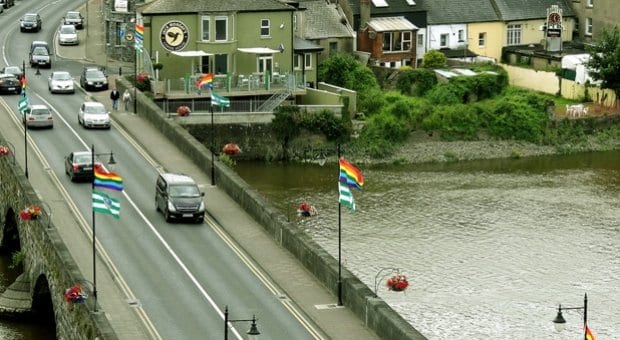
Pride flags flying on the Thomond Bridge over the River Shannon welcome locals and visitors celebrating Pride. Credit: Keph Senett
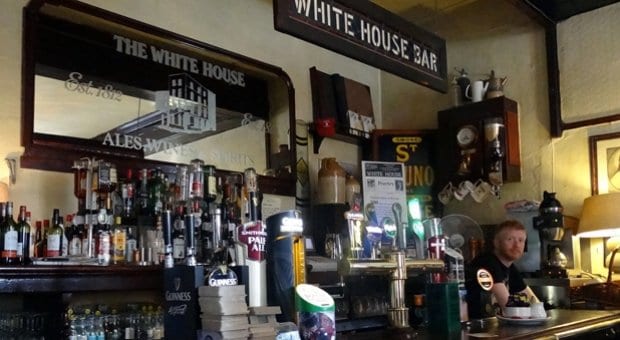
The barkeep enjoys a quiet moment inside the White House Bar. Credit: Keph Senett
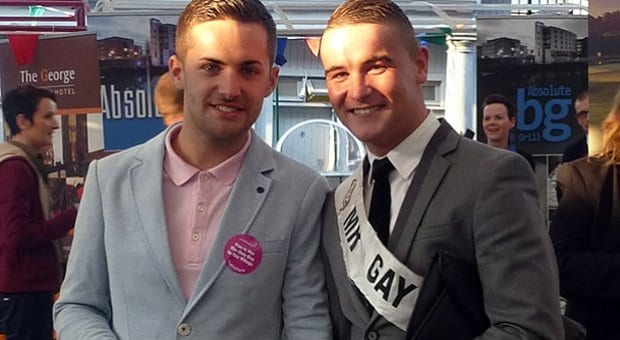
Mr Gay Limerick 2012 Colin Carmody (right), with a gentleman friend. Credit: Keph Senett
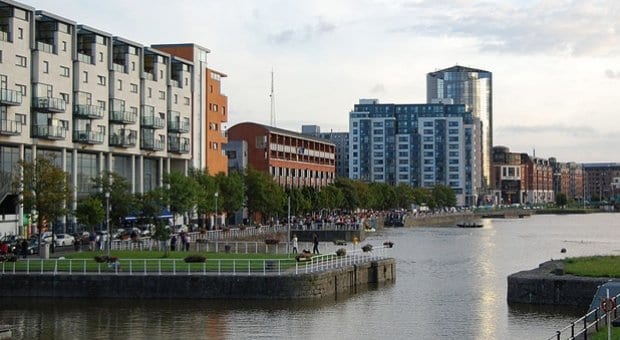
River view along the quay in Limerick. Credit: Luke Curley
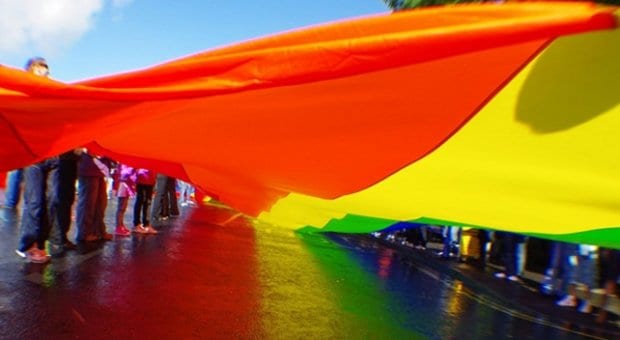
Limerick hosted the town's first official Pride parade in 2007. For people cautious about participating, Limerick Pride suggests "you might help carry the huge flag on loan from Dublin, affording you some sense of security if you are recognized by someone on the pavement that doesn’t know you’re gay." Credit: limerickpride.ie
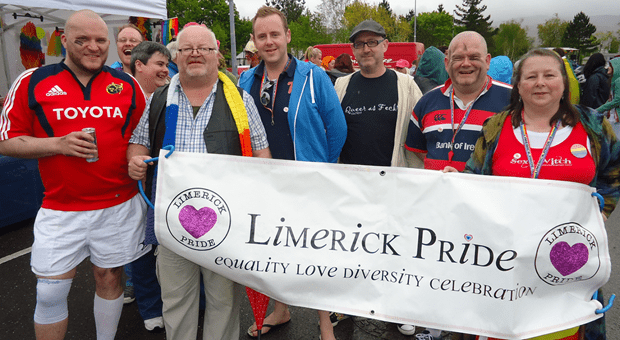
The 2014 Limerick LGBTQ Pride Festival will run Aug 29 to Sept 7. Dedicated volunteers work to create "an annual carnival atmosphere of events that revolve around a festival parade." Credit: limerickpride.ie
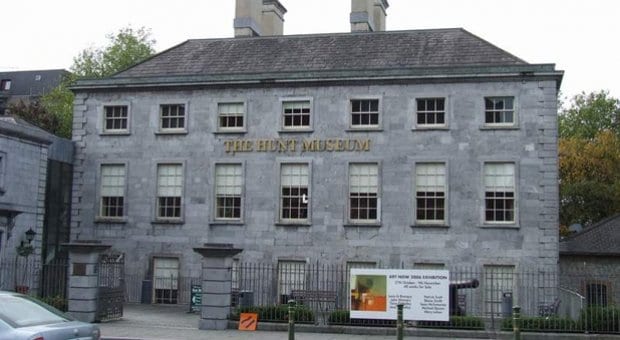
Designed in 1765 by Italian architect Davis Ducart and an excellent example of the Georgian style, The Hunt Museum exhibits the Hunt family’s private collection of art, antiques and oddities. The museum offers queer tours during the annual Pride festivities. Credit: Roland Czaczyk

Local personalities like Miss Elsie Cox add to the nightlife and fun at the popular Strokers bar. Credit: facebook.com/strokersgaybar
There’s nothing original about claiming Irish ancestry — an estimated 80 million people worldwide do just that — but whether or not you count yourself among the descendants of the Emerald Isle won’t change the warm welcome you’ll get in Limerick.
Faithfully described as gritty and squalid in writer Frank McCourt’s masterwork Angela’s Ashes, Limerick (along with the rest of the Republic) later flourished during the Celtic Tiger years. The establishment of the University of Limerick further helped revitalize the city and attracted young people who strengthened markets for sports and the arts. Recently designated Ireland’s first City of Culture, this town of fewer than 60,000 inhabitants is a burgeoning cultural centre. That it straddles the longest river in the nation — “the mighty Shannon,” as anyone will tell you — and is dotted with medieval, Georgian and Victorian architecture is an added draw for sightseers interested in history.
Limerick is a two-hour drive from Dublin, Ireland’s capital city (and the birthplace of famous gay scandal-hound and writer Oscar Wilde), but if you fly into the international airport in Shannon, the journey will take you only 20 minutes. On the way, keep a lookout for the 15th-century tower house Bunratty Castle; if you enjoy live theatre and men in tights, you’ll want to return for the medieval banquet.
At just over 50 kilometres square, Limerick is hardly a large city, and it’s possible to account for the lack of a gay village in this way. More likely, this is because of history. Limerick was founded in 812 CE by Vikings but did not host a Pride parade until 2007. In the context of the nation as a whole, this isn’t all that extraordinary. Ireland has a strong Catholic tradition, and many of its social policies are antiquated (homosexuality was a criminal offence until 1993, and abortion is still illegal), all of which makes Limerick’s renaissance even more alluring.
Like many institutes of learning, the University of Limerick has an LGBT society, which, in addition to offering the usual support services, also puts on periodic dances and events, including Alternative Miss Limerick. Off-campus and in town, gay boys and girls can dance away their nights at Fruit or Strokers, but let’s get real: you don’t go to Ireland for the circuit parties — you go for the pubs. Though not strictly a gay bar, The White House is an overtly gay-friendly establishment featuring regular poetry slams, handsome bartenders and both Guinness and Strongbow on tap.
Speaking of handsome men, Ireland is rugby country, and pro club Munster Rugby is based at Limerick’s Thomond Park, recently named the best rugby stadium in the world in an online poll. The venue also hosts high-level football matches and concerts. If you want to catch some of Ireland’s lesser-known sports — hurling, rounders or camogie, for example — check in with the Gaelic Athletic Association. Finally, if a golf getaway is more your speed, do not neglect to visit the 18-hole championship course at Adare Manor in the village of Adare, 16 kilometres outside Limerick.
If, on the other hand, the only sport you’re into is counting cathedrals and castles, take a walking tour with stops at St Mary’s (the city’s oldest building, founded in 1168 and still in daily use) and King John’s (1210). Also, assuming it’s not too modern for your tastes, duck into the Hunt Museum (designed in 1765 by Italian architect Davis Ducart and an excellent example of the Georgian style) and peruse the Hunt family’s private collection of art, antiques and oddities. Since 2011, the museum has offered queer tours during the annual Pride festivities, as part of its “Alternative Perspectives” programming. The tour is available to book at any time of the year, so call ahead.
Finally, if you’re up for a short road trip, head west for about an hour to the tiny town of Lisdoonvarna. Every September the hamlet is overrun by tens of thousands of people hoping to get lucky at its matchmaking festival. In 2013, for the first time, the village hosted an event for the LGBT community, called The Outing. If an invitation to LGBT daters is not evidence enough of Ireland’s cultural shift, consider, too, that in 2014 the issue of same-sex marriage is slated to be put to referendum.
Limerick is 90 minutes northwest of Cork and about two hours southwest of Dublin. If you’re planning to visit Ireland, for the most up-to-date travel information on gay Dublin, see our Dublin City Guide, Listings Guide, Events Guide and Activities Guide. For the most up-to-date travel information on gay Cork, see our Cork City Guide, Listings Guide, Events Guide and Activities Guide.
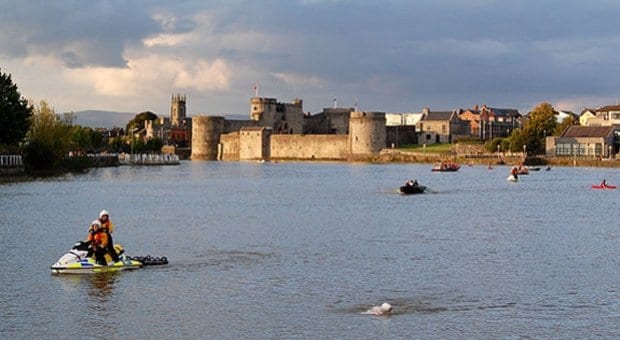
 Why you can trust Xtra
Why you can trust Xtra